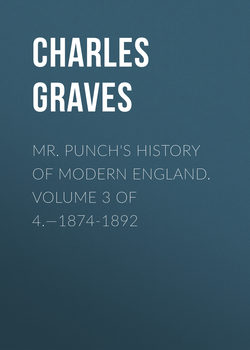Mr. Punch's History of Modern England. Volume 3 of 4.—1874-1892

Реклама. ООО «ЛитРес», ИНН: 7719571260.
Оглавление
Graves Charles Larcom. Mr. Punch's History of Modern England. Volume 3 of 4.—1874-1892
PART I. THE NATIONAL OUTLOOK
HIGH POLITICS
MEN AND MASTERS: WORK AND WAGES
THE STATUS OF WOMEN
EDUCATION
RELIGION AND THE CHURCHES
LONDON AND ITS GOVERNMENT
RAILWAYS AND INVENTIONS: FORECASTS AND NOVELTIES
PART II. THE SOCIAL FABRIC
CROWN AND COURT
SOCIETY
RECREATION, SPORT, AND PASTIME
FASHION IN DRESS
LETTERS AND JOURNALISM: DRAMA AND MUSIC
HEROES AND WORTHIES
Отрывок из книги
The pageant of the Victorian age reached its grand climacteric in the period on which we now enter. As a "drum and trumpet chronicle" the history of the eighteen years from 1874 to 1892 was void of any British military operations on the grand scale. Of the names Kandahar, Maiwand, Isandhlwana, Majuba, Khartoum and Tel-el-Kebir only the first and last minister to our complacency. Yet the achievements of Lord Roberts in the two Afghan campaigns were splendid examples of bold leadership and British endurance, and Lord Wolseley's suppression of the revolt of Arabi was more than efficient. In the mid 'seventies Germany came perilously near forcing a fresh war on France; but the influence of the British Crown and Government was largely instrumental in averting the calamity. We were twice on the verge of war with Russia in 1878, first in April after the Treaty of San Stefano at the close of the Russo-Turkish war, and second in July over Russia's intervention in Afghanistan. The country was divided, for while there had been a revival of the old distrust of Russia, Gladstone had thrown the whole weight of his influence into the campaign of protest against the "Bulgarian atrocities." The Government, on the whole, steered a middle course between the "Jingoes" and those who supported Gladstone's "bag and baggage" policy towards the Turks. At the height of the Tory Press campaign against Russia, Lord Salisbury, in a speech in the City, observed: "It has been generally acknowledged to be madness to go to war for an idea, but it is yet more unsatisfactory to go to war against a nightmare." Punch, who was never pro-Russian, but at the moment was strongly anti-Turk, interpreted this saying as a caution against Jingo scaremongering.
In one of the earliest of his cartoons on the possibility of war over the Eastern question, he represented Disraeli standing on the edge of a precipice with Britannia, asking her to move "just a leetle nearer." Britannia declines to move one inch farther, adding, "I'm a good deal nearer than is pleasant already." But four months later, in May, 1878, when he showed Britannia between two advisers, Disraeli and Bright1– the former wearing a sword camouflaged with an olive wreath —Punch supported neither, but applauded the third Voice, that of Neutrality. Professorial intervention he resented strongly; and severely rebuked Freeman, the historian, for a violent and unpatriotic speech. In fine, he was equally down on the blatant bunkum of the music-halls and the ill-considered agitation of fussy Pacificists; on War-Donkeys and Peace-Donkeys; "Asses are asses, whether bound in Lion or in Calf."
.....
The disaster, however, had one heartening result in the offer of military assistance from Canada, Victoria and New South Wales, duly recorded by Punch in his cartoon of the Lion and the Colonial cubs. The year 1885 had opened with a sinister display of activity by dynamiters, and Punch rebuked Sir William Harcourt for his alleged apathy and imperious resentment of criticism by calling him the "Not-at-Home Secretary." America promptly took legislative action, refusing sanctuary to dynamiters, and was loudly applauded, while Mr. Parnell, in Punch's opinion, missed a golden opportunity for disavowing and condemning these outrages. In "What Mr. Parnell might have said" Punch printed the speech which he did not make but ought to have made, "as a man, an Irishman and a Christian."
Mrs. Gummidge-Gladstone: "I ain't what I could wish myself to be. My troubles has made me contrairy. I feel my troubles, and they make me contrairy. I make the house uncomfortable. I don't wonder at it!!!"
.....